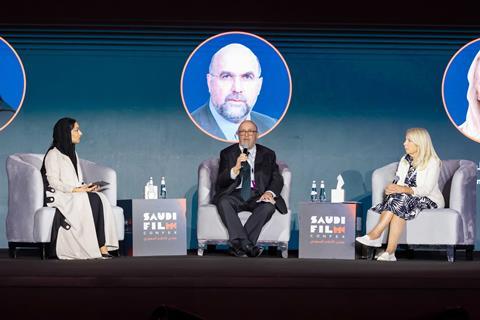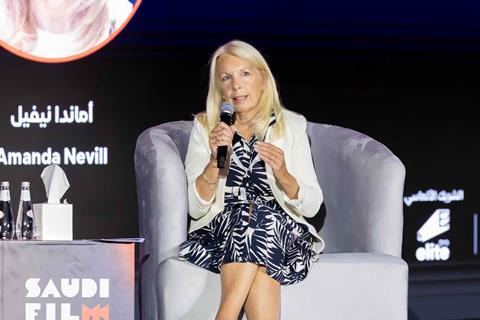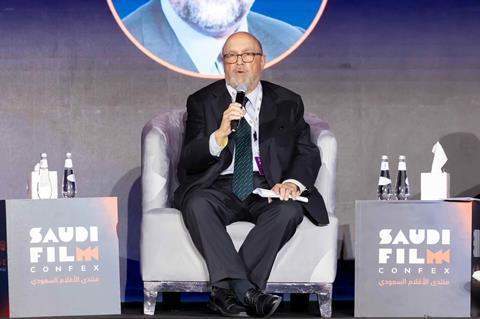
Two film industry veterans – former BFI CEO Amanda Nevill and ex-Paramount Pictures president Tom McGrath – set out their recommendations for how Saudi Arabia can continue to grow its film sector during a Saudi Film Confex panel this week.
Both were speaking on a panel about the future of the Saudi film industry, which has grown rapidly as part of the country’s 2030 plan to diversify its economy away from oil. The country’s first cinema only opened in 2018 after a 35 year ban; it now has over 650 screens.
McGrath said he’d seen a number of markets go quickly from infancy to maturity during his career, citing the likes of South Korea, China and Turkey.
Comparing them, McGrath said the Saudi market is still in the “toddler phase” – a period when local filmmakers can feel that raising capital or securing distribution is very challenging.
But McGrath said Saudi was looking to develop its industry at an opportune time, given the accessibility of digital technology. “It is probably the most exciting period for creators of new content that I’ve seen,” he said.
“The key for Saudi is to remove as many barriers as possible - providing training at an early age, providing government resources where needed, encouraging the development of private capital around the industry and expanding the distribution market,” said McGrath, currently a partner at ILP Theatrical and board member of vfx giant Prime Focus.
“This is not the first country which in the course of five years has tried to launch a major film industry. If you stick at it, if you work cooperatively, if you view it as a community and not just as a zero sum game, it will happen.”
He said the Saudi industry also had many advantages. Many of its locations and stories have never been seen on film before by international audiences. “Audiences in general are looking for the new and this right now is new for most of the world.”
McGrath, whose career included five years as president of STX Entertainment, suggested that the Saudi industry focus on its home market initially. “People want to see celebrities and stars that they can relate to, that they can dream about meeting and that they can actually meet.”
He said the Saudi industry should not be overly focused on just trying to attract foreign productions. “That will come. But to really build the market it’s about focusing on what is special and unique about the culture and the people and the land here.”
Managing expectations

Nevill, who joined the Saudi Film Commission board five years ago, cited the huge potential for the Saudi industry, but also stressed the need to manage growth expectations. “This is a 20-25 year horizon we should be looking at,” she said.
She said there is a common theme linking countries which have successfully built their film industries in a short period of time: “It is because they have huge government support and a clear direction. The government has empowered an agency, a central body, to help that country identify what it needs to do.”
“The Saudi Film Commission from the get-go was determined to have a long-term strategy. It wasn’t a strategy about just throwing some money to get some high profile people to come and make some films here. They were really concerned to ensure that they developed an industry which would be sustained right from the grassroots.”
Developing talent and infrastructure have been key focuses for the Commission, as well as initiatives such as preserving archives, she said. In some areas, such as skills, Nevill said Saudi is developing its industry better than the UK.
“Everybody knows that the UK is a great cultural and vibrant place to make films and it’s financially a great place to make films. But I sit in the UK and I look at areas where I think Saudi is doing it better. For example, the development of skills in the UK. You’ve got years and layers of slightly messy skills development. In Saudi you’ve got the opportunity to do it really properly so there are more opportunities for the people of the country to enter the industry and a much clearer trajectory,” said Nevill, who has estabished a busy non-exec career since leaving the BFI, including as strategy advisor to Olsberg SPI.
The Commission is also focused on making sure that key Saudi film centres around the country, such as AlUla and Neom, succeed too, said Nevill: “It is essential if you want that joined up countrywide, sustainable industry.”
Tax tweaks

The Saudi government should look to make to its film incentive programme more attractive to the international industry, suggested McGrath.
He noted that the headline rate of the incentive, which offers a 40% rebate to filmmakers, is internationally competitive. “But there might be some more streamlining of the process and the paperwork,” he said. The incentive’s benefits also need to be more widely communicated to international producers, he said, so the country attracts more co-productions.
McGrath also said the Saudi industry needed a more “systematic approach” to developing links with international producers so that they extend past a single film.
The Saudi industry needs to focus on becoming “front of mind” for producers looking for co-production partners, he said. “Every time you enter into one of these co-productions or transactions, you should always be thinking about what the next one is and if at all possible trying to develop two at a time.”
Fostering creatives
Nevill, meanwhile, noted the importance of creative success by Saudi filmmakers, citing the selection of Venice premiering Hijra as the country’s entry to the Oscars as well as multiple Saudi films playing at Cannes this year.
“The wonderful flashes of creativity starting to come out from Saudi are probably your most compelling calling card for future partnerships,” she said. “Creative people love to mix with other creative people,” she noted.
“Given that the Saudi industry is so young, the most important thing over the next few years – and it’s already been started - is to ensure that you can bring as many people into the country to broker new friendships and partnerships, and also that there are the opportunities like Confex, for real, new friendships to be made.”
Similarly, Nevill said it’s vital for Saudi to ensure that its upcoming filmmakers have the opportunity to visit major film markets around the world.
Mena distribution
McGrath stressed the need for Saudi filmmakers to secure distribution for their films not just in the Saudi market, but also in other Arab speaking markets and internationally.
“It is as important that the entire region see the work as it is to figure out how to get it entered at the Cannes Film Festival,” said McGrath.
McGrath suggested MENA governments should collaborate to make it easier to theatrically distribute films in the Arab speaking world. “A distributor should be able to seamlessly book the film in any of the territories where they want to book it.”
He said MENA countries need to strike agreements on issues such as tax stamp regulations, import regulations, shipping requirements and clearances. “At the moment, it’s a checkerboard of regulations and requirements across the various territories. That is a worthy subject for multinational discussion in terms of film cooperation and coproduction. Regularising the taxes, in particular, is important.”
McGrath also said the industry should get behind an aggressive programme of support for filmmakers to make short films for social media and streaming platforms, of around 3-5 minutes each.
“Think about a more aggressive, larger scale, publication and production of short subjects as a way to just continuously keep your message out there…so there’s this constant presence of creativity and imagination and production from the territory coming out.”

























No comments yet